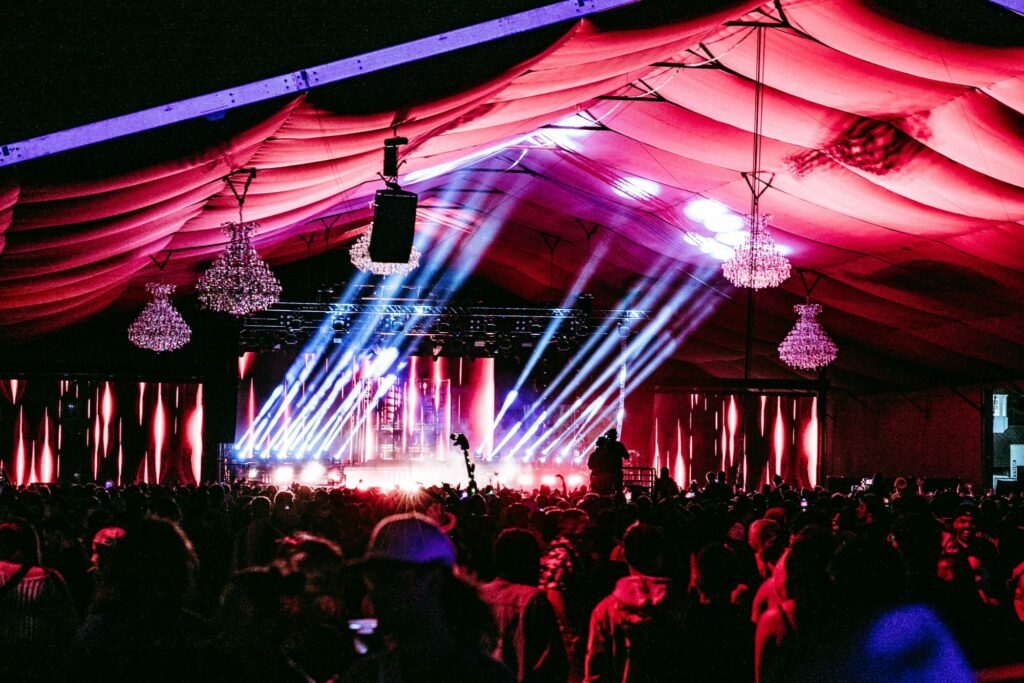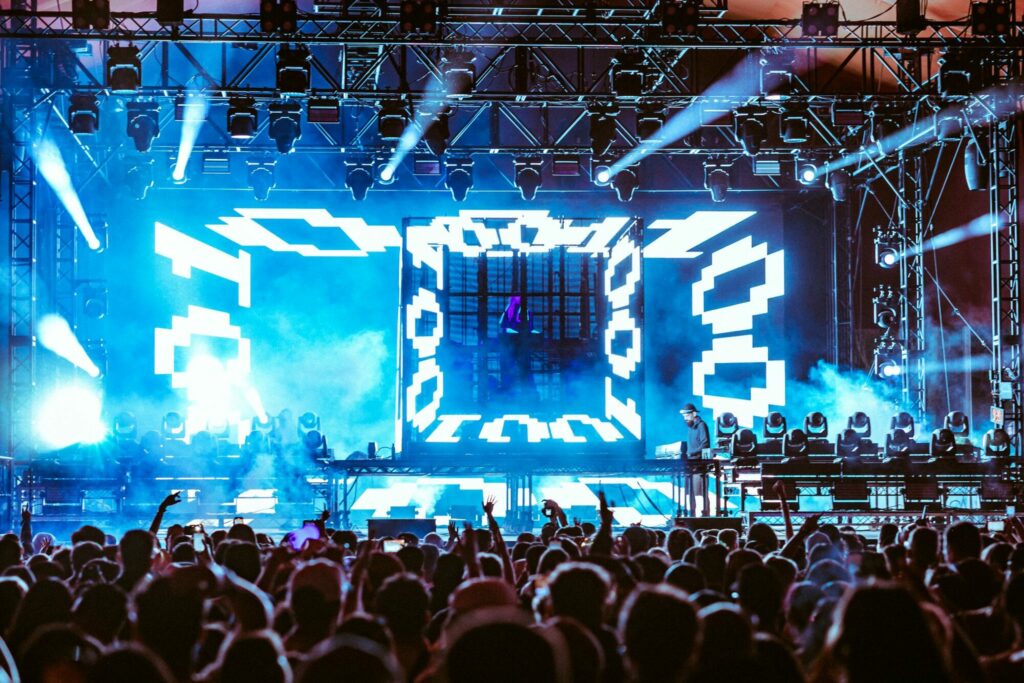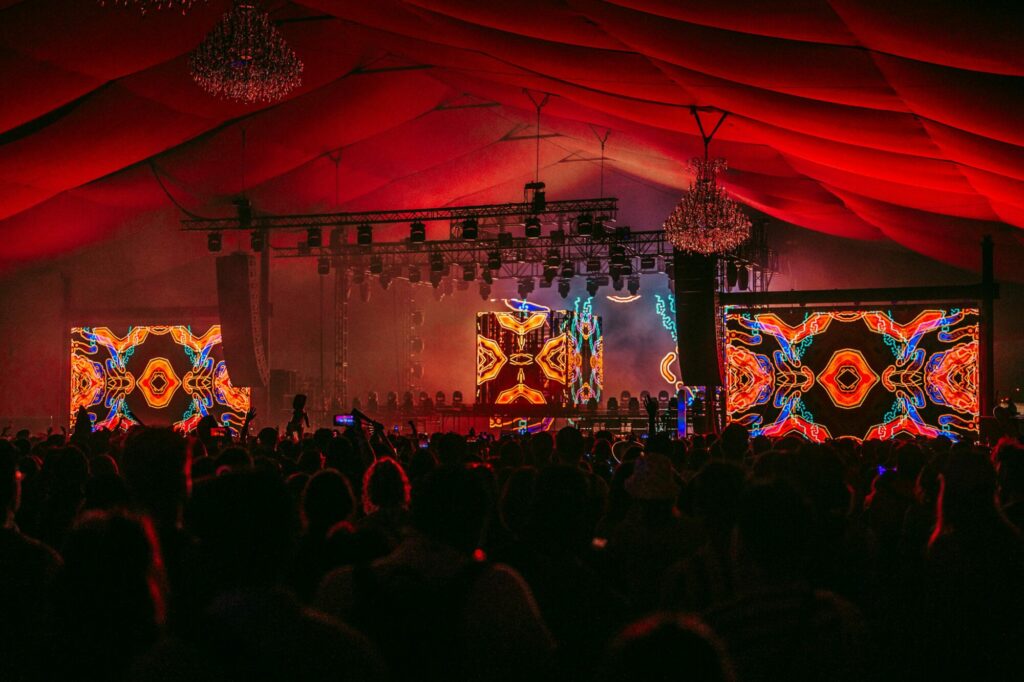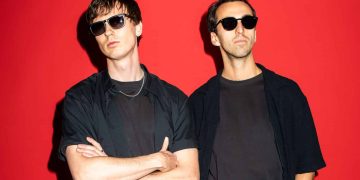We caught up with Whyte Fang at Coachella to talk about the festival debut of her project, her new album GENESIS, and more.
It was just months ago when Alexandra Sholler, the multifaceted producer and DJ that many know by the name of Alison Wonderland, formally introduced to the world her Whyte Fang alias. Characterized by a darker, more experimental sound that draws from a wide array of genres and live shows that stun with their immersive visuals, the Whyte Fang project has taken the dance scene by storm while taking Alex’s production prowess to new heights. Attend a live show, and you’ll find her caged, shadowy figure adorned in neon embellishments throwing down a mind-shattering set that engages all of the senses.
As singles like “TIDES,” “333,” and “Girl” began to roll out last year, anticipation for what the future would hold for Whyte Fang grew rapidly. In April, that anticipation culminated in Whyte Fang’s debut LP GENESIS, which features a collection of tunes that welcome listeners into an underworld of ornate, multidimensional sounds that tell the story of the alias. With appearances from artists like Erick the Architect, Elohim, and Jay Watson, the album offers an all-encompassing experience with tons to dig into.
To make it all even better, GENESIS, which finds its home on the producer’s recently launched record label FMU Records, was unveiled to the world the same day Whyte Fang made her festival debut at Coachella. Her show-stopping performance was met with rave reception from the crowd as she played out tracks from the album like “Deep End,” “One Million,” and “SCREAM,” which featured a cameo from Erick the Architect. And, as if all of that isn’t enough, she did it all while far along in her pregnancy – a true testament to the fact that women are powerhouses.
We got the opportunity to sit down with Whyte Fang at Coachella and talk all things GENESIS, FMU Records, and the collaboration process. Read on to pick the producer’s brain, and make sure to stream GENESIS on Spotify below or your preferred streaming platform!
Stream Whyte Fang – GENESIS on Spotify:
First of all, thank you for talking to us! This is your festival debut of Whyte Fang – how are you feeling? How did you feel being up on that stage in front of such a large crowd [last Friday]?
I honestly felt so excited. I just wanted to get up on stage. I’ve been working with my team on the show since probably August last year. Before I even finished [GENESIS], we had already started working on the concept and the visuals of the songs that had already been done. I was just so anxious, in a good way, to just get it out there and really show people exactly what Whyte Fang was. I felt like I needed to show everyone exactly what it was in order for it to translate, so I was just super ready to do that. The album had come out that day. Honestly, we had the craziest crowd; it was amazing. It was really amazing, and I really feel like people properly saw my brain.
Whyte Fang is signed to my own label, FMU Records, and no one got in the way of anything to do with this entire project. It was all my brain. I worked with Tyler and Dave, who work on lights and visuals with me, for ages. And Garth, my manager. We all had this vision, and the only time you saw me, I was lit up in blacklight, and I was behind a screen. It wasn’t about me; it was about something way bigger than that. And the response was so fucking great. I couldn’t have asked for anything better. I always get nervous before playing uncharted territory, whether it be a new stage that I’ve never played on or if I’ve played on it before; it’s less of a thing because I understand what the vibe is. So nervous wasn’t a bad thing for me; it’s more just these nerves of needing to get on stage and play, and I was really excited.
Something people might not know is that Whyte Fang predated Alison Wonderland, so this is something that’s been in the works for a long time. Has tapping into the Whyte Fang project brought you back to that mindset you were in years ago when you started it?
I’ve never put that out there for what this is. Music is ageless; music is genderless; music is a spirit; it’s an energy. Whatever I’ve been making now is exactly how I feel at the time, at the present. Every time I make a track, I’m making it when I feel it at the time. I made most of this album, actually, pregnant, and honestly, it’s just encapsulating how I feel now. I don’t like to look back. I like to be in the present, and I like to look forward because if I were to look back, I would cringe at a lot of things. I don’t have any regrets in my life, but I think when people look back and reminisce too much, it stops them from moving forward. So for me, it actually has nothing to do with that.
The only reason why it predated Alison Wonderland is because that’s how I learned to produce. I learned to produce as Whyte Fang, and then when I got signed to a major label, they wanted to put a face to the music I was producing, and Whyte Fang didn’t have a face, so they put it to Alison Wonderland. But there’s no reminiscing, and honestly, the only thing I feel connected to with Whyte Fang in the past is that’s the way that I learned how to produce.
I heard The Knife’s “Silent Shout,” I lost my fucking shit, I don’t know when it was – but it was whenever that record came out, and I went, “I want to make emotional music that is electronic. I want to make people feel something, and I don’t know how to do it yet.” I tried to copy The Knife, actually, eventually – it didn’t work because I don’t sound like The Knife, but that’s how I learned how to produce. I tried to make those arps, I tried to emulate how she did her vocals originally. Whyte Fang now is not so much about my vocals or anything like that, but I just tried to listen to everything, and that’s how I learned how to produce was listening to The Knife and trying to be Whyte Fang.
When you listen to my earlier stuff, I did a whole EP called The Version Suicides, where I took a punk vocalist called Patience from a punk band called The Grates, and I redid their album – I think this was in 2012 – and you’ll hear elements of that. Then I discovered [Hudson Mohawke], and the drums changed for me, you know what I mean? I basically took The Knife and HudMo and tried to do these melodic, weird, eerie synth sounds, and then I took the drums from HudMo – even Outkast, I was listening to a lot of rap, kind of that southern Atlanta rap – and I wanted to combine those two styles, so that’s how Whyte Fang started.

Absolutely, all that matters is the present and moving forward. Circling back to FMU Records, you already have releases from artists like Jon Casey, Dabow, Aliiias, and SIPPY. How can you find a middle ground between allowing that record label to embody who you are as an artist while also allowing these artists to approach it with their own sense of individuality?
I think that just by me curating these artists is how I am representing myself in this whole record label. I’m a fan of all of these artists. I tweet this, I talk about it, and I preach it constantly; the kids in their bedrooms making beats are better than the fucking mainstage shit that I’m hearing, honestly. I stand by that, I really stand by that. Every time I’m playing EDC or whatever it is, if it’s not my own music, I always gravitate to the underground. I’m a fan of all these artists – I’m a huge fan of Jon Casey, Dabow, SIPPY, Aliiias, I’m a huge fan. I couldn’t even believe they agreed to sign on to the label because I listen to them as a fan.
And actually, the biggest thing I would say about my label is I leave it pretty untouched, and I say, “Do what you want to do.” This is just a platform for you, and there’s no pressure for you to go on social media and make a thousand TikToks. Even the feeling of releasing a song helps someone have the confidence to release even more songs. Anything I can do with my platform – play it, send it around, service it to Spotify – I’ll do, and if that’s a leg up or a stepping stone to where your next career is, that’s all I want to be. I just want to be a stepping stone, and I want you to know that you’ve been heard.
I think, especially in this day and age, with social media and everything moving so quickly, it’s really, really difficult to establish yourself as an artist now. I think about it, and I go, “Thank God I came up in the SoundCloud era,” because I think now having the pressure of being a content creator and someone that sits in their bedroom and makes music, it’s really difficult, and not many people can do it. A lot of us are introverts, and a lot of us like to stay in our studio and feel awkward on camera, you know what I mean? It’s like a different thing. So for me, what I want to do is just be a fan of people that I hear and say, “Hey, do you want to release a song?” No pressure, they’re never signed to an album, and they’re never locked in. I’m just like, “Let’s release.” And if that’s something I can do for artists now, I’ve done something. If I see Jon Casey up headlining in two years or whatever, I’m gonna be like, “Hell yeah, I got to release a song of his. That’s crazy.” And that gives me my soul satisfaction.
That’s great! Going back to GENESIS, were the sonic concepts on this album ones that you already had in mind before making it? Or was it more of a gradual process?
When I’m creating, I’m very in the moment, so every song you hear on GENESIS is a very flow state for me. There are some songs, like “Transport God,” “333,” “Girl,” “One Million,” “Go,” “Genesis” for the most part – apart from the vocals, which came in later – I made all those songs in a day. Actually, Pete Don, my photographer who’s standing right there [gestures], I made “Genesis” on his kitchen table. I feel like you never feel the same one day after the other. I think that sometimes when I feel super creative, I just sit down and make these beats, and I don’t really want to mess with them that much because that’s how I felt on that day.
Obviously, you go back during the week and you tweak them and make sure everything’s in the right place. But for the most part, those ideas for me, and in my whole career, have never been planned. When I create, I’m never overthinking, and I’m just kind of in this weird, creative little bubble, whether it be songwriting or writing chords or whatever. I just kind of go with how I feel. I wish I was more planned sometimes – I wish that I could sit down and be like, “I’m going to make a song that sounds like this,” because I think maybe sometimes it’s easier to be that formulaic.
But yeah, I’ve always just been a creative that goes with the flow, and I’m kind of like that in life. If you ask me what I’m going to do next week, I can’t tell you. I know what I’m going to eat in an hour, actually, because I just ordered it [laughs]. But I think I feel my way through this for the most part. Even with Whyte Fang, I knew what I wanted to do and how I wanted to do it, but I didn’t know when I wanted to do it. And then it finally felt like the right time, and I just listened to my intuition. I think listening to your intuition is the most important thing. Intuition is a very undervalued part of a human – we have it, and it’s very strong, and we should listen to it.
Thank you for that reminder! I need that a lot of the time. We don’t have to think so much. We can just depend on our intuition.
You gotta!

You have a mixed bag of collaborators on this album, like Erick the Architect and Jay Watson from POND and Tame Impala, which is incredible. How do you think that having these collaborators featured changed or had an impact on the direction of the album, as opposed to if it had been all 100% you?
The best part of these collaborations is that they’re my friends. There’s no ego when you’re creating, and that’s the only way I like to create, actually. You’re able just to accept ideas and go back and forth. Every time I’m even working with someone, I’ll observe them and learn something from them, or I’ll be inspired by them. When you have a really good, creative connection, bouncing off each other creatively can actually make you a better artist and make the song better. I think every time anyone like that, who I love and respect, sends me anything, I want to do it justice, and I want to do the best I can, and I think it actually puts pressure on me not to be a lazy producer or a lazy writer.
Erick is a really good friend of mine, and having his vocals on “SCREAM” was so easy because we get each other. It was different with Jay- he sent me the synth part before I even started [“Genesis”], and I just heard it, and something clicked. So the main synth that comes in that’s him playing. As soon as I heard it, I went, “Oh, okay, I know what to do with this.” Actually, Barney Bones as well; he knew my tour manager. My tour manager Cody sent me the vocal [for “Alive”], and it was just an mp3 – still is just an mp3, actually. I never got the proper vocals; it was like a voice memo or something. [Laughs] And I knew exactly what to do with it. I didn’t actually know Barney, but I knew exactly what to do with it when I heard the message of that song. If you listen to the lyrics of that song, it’s really sad, and I wanted to do it justice, and I wanted to give it strength because it’s about a friend of his passing away. That guy can really write lyrics.
So for me, whatever I hear that calls to me quickly, I jump on. And if it’s with a friend and I know we have creative chemistry, it’s always easy. If someone doesn’t like a part of the track or they want changes, it’s easy just to go, “I don’t like this. Can you send this back?” I’m also an incredibly blunt person. I don’t like beating around the bush – it’s a waste of time, and it’s not genuine to me. And so, when I’m in the studio, it’s very blunt. That’s why collaborating with people is important because it makes you a better artist for sure.
It makes you a better person looking at other people be creative. Everyone’s different in the way that they’re creative. I remember in 2011, Flosstradamus was showing me how they worked, or [Mr.] Carmack – I take little bits from what they’ve shown me and if it speaks to me I use it all the time, actually. There are a couple of hacks that I’ve learned just from being around other producers where I’m like, “Oh yeah, this is sick. This’ll work.”

That’s awesome. So, this album was something that you made entirely during your pregnancy?
I’d say 65% of it I was pregnant, and then the rest of it was before or just before.
Did you come up with the idea of GENESIS when you found out you were pregnant?
No, I was actually going to do a self-titled album, and then the last week, when I handed it in, it just kind of came to me. The same thing happened when I did Run, Loner, Awake, Calm Down – they appear to me, these names, and I’m like, “That’s the name.” I just knew it. I’m hoping that’ll happen with my kid because I still don’t know what name to choose [laughs].
But yeah, I think again, intuition – something said Genesis. I didn’t actually have a name for the “Genesis” track, and then I thought, okay, maybe I’ll call this track “Genesis” because it has this weird sound. “Genesis” to me had the same color-sounding words as the song, I don’t know how to explain it. Then I thought that was a good name for this record because it is the start of something new, and in my life, there was something that was starting new. Every time I make an album, it’s a time capsule of a part of my life, so if I can put one lyric into the album, it’ll be that.
Congratulations, by the way, on your baby!
Thanks! I’ve always wanted to be a mother, and finally, getting that is really giving me a lot more purpose.
That’s beautiful. Is there a lesson that you’ve learned as an artist that you want to teach your baby?
Leave your ego at the door. I think that so many people forget where they came from and forget gratitude. I see so many artists act too big for their boots, and then the humble ones are the ones that always end up making it, and I see them ten years later, and they’re killing it. So honestly, it would just be, don’t be an asshole.
I think that’s something we can all learn from. Finally, do you have a message for your fans and listeners?
Yes, oh my God! Thank you so much for listening to this album. The one thing I’d say I was nervous about was putting the album out because I had put so much into it. I’m really proud of this record, and I was scared no one was gonna hear it because it wasn’t being released under my name on a big platform or with a major label. But honestly, Garth, my manager right here, [gestures] did a lot of work on the album, getting it heard and doing that. And I have such a great team, so they’re awesome.
But everyone that’s actually listened to the album in full, I appreciate you because I curated this to be an adventure and a journey. I wanted people to listen to it fully, and I really do think people are. Last week, I heard that I was the highest-spiking artist on Spotify at Coachella. We spiked in listeners on Spotify by two thousand percent. That sounds made up, I thought it was made up. And then I asked Garth, and he was like, “It’s not made up,” and there were articles about it. So whoever did that, thank you, because I was not expecting that. I was a little bit nervous about releasing this record, and if it translated with you, I appreciate it a lot.
Follow Whyte Fang:
Website | Twitter | Instagram | SoundCloud | YouTube








